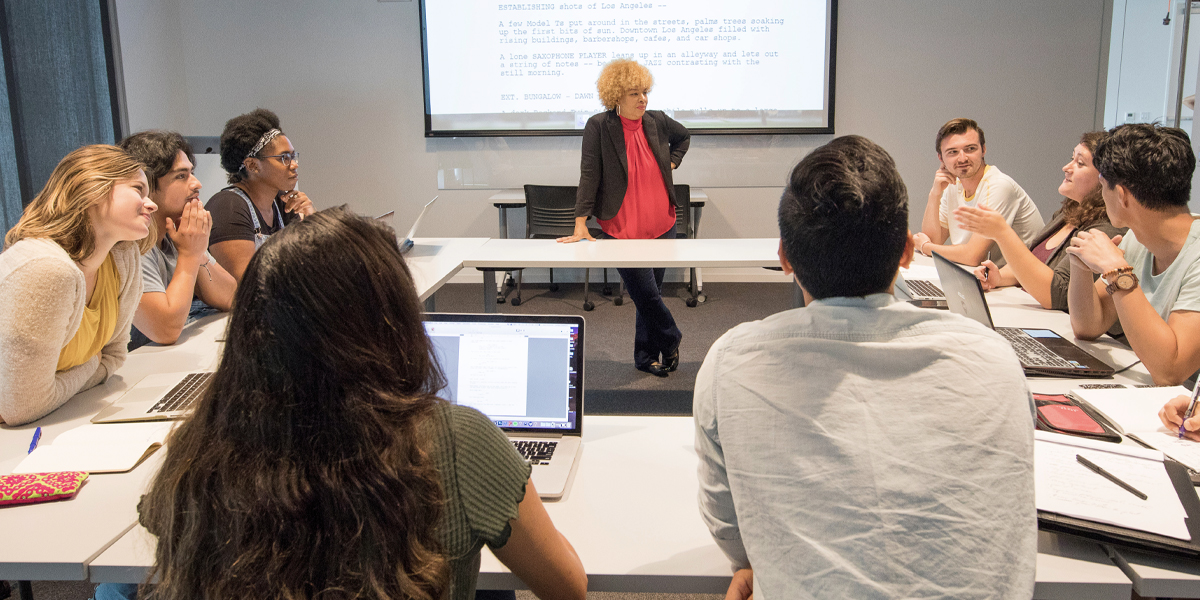Ignatian Pedagogy

Jesuit schools are renowned worldwide for their excellence in education, especially at the secondary and post-secondary level. But what makes a Jesuit education distinctive? What do students at a Jesuit institution learn, and how?
Jesuit education has always had characteristics that distinguishes it from other pedagogical approaches. These characteristics are rooted in the Ratio Studiorum (Latin for "Plan of Studies"), the 1599 document that standardized the worldwide system of Jesuit education. However, modern realities required new articulations and expressions. In 1993, the Society of Jesus published "Ignatian Pedagogy: A Practical Approach," a document that more clearly identifies and articulates the Jesuit model of learning and teaching in the contemporary context.
As "Ignatian Pedagogy" emphasizes, Jesuit education aims to form persons of "competence, conscience, and compassionate commitment." In order to enable this formation, Ignatian pedagogy is fundamentally structured on experience, reflection, and action. Through these elements, "teachers . . . accompany their students in order to facilitate learning and growth through encounters with truth and explorations of human meaning."
In its contemporary articulation, the Ignatian pedagogical paradigm consists of five steps:
CONTEXT
Understanding the real context of the life, culture, and environment of the student
EXPERIENCE
Providing both cognitive and affective learning opportunities
REFLECTION
Deepening understanding of what has been learned and its meaning for oneself and others
ACTION
Internal and external manifestations of what has been learned
EVALUATION
Consideration of subjective and objective measures of growth
These steps are fundamental to the Ignatian way of proceeding in education, in all academic disciplines as well as in extra- and co-curricular activities. They shape a vision of a whole person educated for faith and justice and are oriented toward enabling and supporting that goal.
Resources for Ignatian Pedagogy
-
- What is Ignatian Pedagogy? - Simple slideshow introduction to the Ignatian pedagogical paradigm, from LMU's Office of Mission and Ministry
- "Gifts of Our Ignatian Heritage/Jesuit Education and Ignatian Pedagogy" - One-sheet primer from Xavier University's Office of Mission and Identity
- "What's so great about Jesuit education?" - Article in America Magazine summarizing key values of Ignatian education, by Fr. James Martin, SJ
-
- The Characteristics of Jesuit Education (1986) - Document which emerged in response to a period of reflection and discussion in the 1970s and 80s within the Society of Jesus about the nature of Jesuit education, especially questions of mission and identity, in Jesuit schools (primarily high schools, though the document is applicable to higher education as well). It forms the basis for contemporary understandings and discussions about the mission of Jesuit education in all contexts.
- Ignatian Pedagogy: A Practical Approach (1993) - Document applying the principles laid out in "The Characteristics of Jesuit Education" and explores practical applications in classroom teaching and learning.
- Jesuit Education and Ignatian Pedagogy (2005) - Address by Fr. Peter-Hans Kolvenbach, SJ (Superior General of the Society of Jesus 1983-2008)
- Challenges to Jesuit Higher Education Today (2010) - Address by Fr. Adolfo Nicolás, SJ (Superior General of the Society of Jesus 2008-2016)
- Characteristics of Jesuit Colleges and Universities: A Guide for Mission Reflection - A framework for reviewing and reflecting upon the Jesuit and Catholic identity of members of the Association of Jesuit Colleges and Universities (AJCU)
-
- The Ignatian Pedagogical Paradigm, collection of online resources from Xavier University's Office of Mission and Identity
- Ignatian Pedagogy, collection of online resources from Georgetown University's Teaching Commons
-
- Reflection in Action: A Signature Ignatian Pedagogy for the 21st Century (Mountain and Nowacek, 2012) - Overview of key concepts and elements of Ignatian pedagogy
- Ignatian Pedagogy, Compatible with and Contributing to Jesuit Higher Education (Joseph deFeo, 2009) - Exploration of the principles of Ignatian pedagogy and their relationship to Jesuit education
Case studies and examples:
- Teaching to the Mission - Compendium of implementation and examples of Ignatian pedagogy across numerous disciplines, from Xavier University
- Bicycling Seminar and Ignatian Pedagogy for Sustainability (Smythe, 2019) - Case study for a bicycling first year seminar with a focus on environmental sustainability
- Implementation of Ignatian Pedagogy in a Jesuit University in Indonesia (Harendita et al., 2019) - Examination of students' perspectives of implementation of elements of Ignatian Pedagogy in a non-US context
- Introduction to the Ignatian Pedagogical Paradigm - An Online Course for Librarians (Kowalik et al., 2019) - Case study of the development and delivery of a formation program for academic librarians
- Learning Through Reflection in Management Education (Quijada et al., 2016) - Case studies of incorporating reflection in business courses
-
Course design and syllabi
- Tips for Practicing Ignatian Pedagogy: Syllabus & Course Development - Ideas and suggestions for integrating (or mapping) elements of the Ignatian pedagogical paradigm in course design, from Saint Louis University.
- The Ignatian Syllabus - Tips for structuring syllabi around the Ignatian pedagogical paradigm, from Saint Louis University
- A Best Practice Checklist for Jesuit Education and Online Learning - Tips, guidelines, and best practices for Ignatian education in an online environment, from Xavier University
- Teaching to the Mission - compendium of implementation and examples of Ignatian pedagogy across numerous disciplines, from Xavier University
Activities and Templates
- Guidelines for Effective Reflections - Template for guidelines for students when engaging in reflection exercises, adapted with permission from Quijada et al.
- Tips for Practicing Ignatian Pedagogy: Reflection Assignments - Ideas for integrating reflections into coursework from an Ignatian perspective, from Saint Louis University
- Ignatian Pedagogy and Media Literacy (Wisler) - Ideas for applying Ignatian Pedagogy to building media literacy skills, from the Center for Social Justice Research, Teaching & Service, Georgetown University (full presentation here)
- Examen for First Year Seminar - Template for Examen-like exercise for use by FYS students and others; created by Nicole Bouvier-Brown (Chemistry and Biochemistry) and Sue Scheibler (Film, Television, and Media Studies).